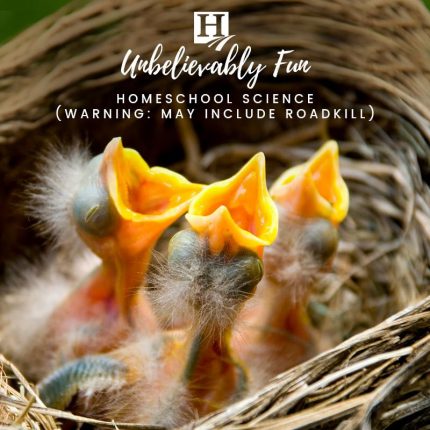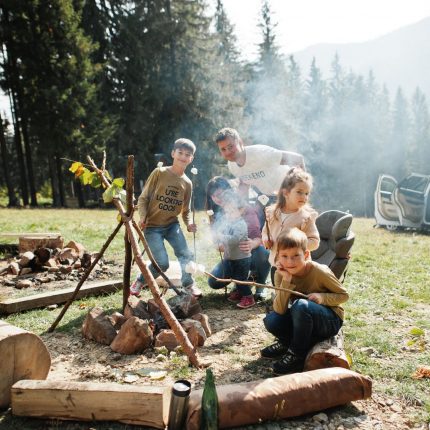
Unbelievably Fun Homeschool Science
March 31, 2020Science is one of those subjects that people either love or hate. Unfortunately, it’s often associated with complicated equations, monotonous data collection, and an incredibly long process from start to finish. It can take anywhere from a few days to years to see results. All of this and more can make homeschooling parents shy away from exploring science with their children. It’s a shame because when presented right, science can be one of the most fascinating subjects of study! Homeschooling science doesn’t have to be dry or complicated, and for those beginning to homeschool, we want you to know that it can be filled with fun and discovery!
For too many years, schools have introduced science through the lens of textbook lessons and complicated projects. So, if you are wondering how to homeschool science, we ask you to suspend your disbelief that it’s a fun subject. With these crazy fun experiments, homeschooling science is far from boring! Need a fun science fair project? One of these experiments would be perfect! Read on to find out about people-powered research and how to use it for homeschooling science.
What Is Citizen Science?
Have you heard of citizen science? This is a relatively new trend, but it is catching like wildfire. The popularity of this idea is obvious since it gives regular people the chance to participate in important scientific projects without complicated work. To explain citizen science, let’s explore the background of scientific findings.
As homeschoolers, we learn from the final result of science projects. Our curriculum, worksheets, lessons, and answer keys are derived from the work of innumerable hours of data collection, sampling, monitoring, and finally, checking, and checking again. The sheer size of a project that results in a scientific report requires a vast amount of work before we can even hear about the findings. Why does it take so long and require so much effort? Project fundings often only allot enough payment for a limited number of people to formally participate.
This is where citizen science comes in! Citizen science is a powerful movement because it welcomes the involvement of the public in helping with collection and information. As people channel their interest in various topics of science to contribute to these findings, not only is the burden on scientists reduced, but the timeline may be shortened, and the results could possibly yield greater accuracy, depending on the quantity of entries.
The best part about citizen science is that it shows a real-life application of science to our students. These aren’t merely experiments you found on Pinterest or were suggested in the textbook, these are actual projects that real scientists are working on! For homeschoolers, citizen science can be a fantastic idea for a fun science fair project or simply as new activities for kids!
Incredible Citizen Science Experiments for Homeschoolers
If you are on the lookout for fun science experiments, look no further! Homeschooling science is about to get super exciting with these real science opportunities for your kids. Citizen science is a wonderful way to show your children the impact that the public can have on scientific findings, teach how science works in the “real world,” as well as provide fun activities for kids! As you prepare to begin homeschooling science, you can keep it fun and engaging by focusing on fun science facts and bringing in as many hands-on projects as possible! Science is unique in that the results are often tangible.
When you are researching how to homeschool science, you will likely find varying answers. Everyone has ideas on how to approach homeschooling science, however, we would suggest simplifying. Our favorite way to teach science is to use unit studies and projects to teach concepts through hands-on methods whenever we can. Take a look at these current citizen science experiments to get started!
- Track Roadkill. With this project, you’ll help locate hotspots for roadkill to help monitor and reduce future incidents. Extremely valuable data can be collected from roadkill, such as migration patterns, local populations, and potential changes to the surrounding wildlife.
- Galaxy Zoo. Is one of your children fascinated with space? With this project, your children can look to the stars to help astronomers learn more about galaxies!
- The Great Sunflower Project. Get some fresh air outside and learn more about pollination. Bees are incredibly important for our world, so this project takes a look at their impact right in our own backyard.
- Penguin Watch. Help scientists learn about the declining penguin populations in Antarctica and the Southern Ocean by counting penguins. Researchers are trying to understand more about their lives to discover why certain populations are dwindling.
- Nest Quest. If you live in these regions with robins, you can help scientists learn why the populations are declining by watching and recording their nesting patterns.
- Rainfall Rescue. Contribute to digitizing historical rainfall records for a more accurate and readily available archive. This project will help scientists looking to evaluate current trends and future predictions!
- Discover Floating Forests. Look through pictures from space for forests of kelp within the oceans! Researchers would like to know more about how these kelp forests grow and change over time.
- Parasite Safari. In Africa, safari watering holes are necessary for wildlife, however, they also tend to breed parasites and bacteria. Help scientists by classifying images from their watering hole webcams to determine which animals are visiting the water at certain times of the year.
- Fossil Atmospheres. Ginkgo trees have historically existed before even dinosaurs. Contribute to the research of the ancient Earth’s atmosphere by examining ginkgo leaf fossils.
- Manatee Chat. Identify and classify manatee calls! Researchers are investigating how manatees communicate, so you can help by classifying their signals and vocalization.
There are several more citizen science projects available thanks to numerous websites. Even if our previously mentioned projects don’t catch your eye, take a moment to browse these websites and I’m certain you’ll find a fascinating option! Enjoy!
Courtney Newman
Courtney Newman is a homeschooled graduate with a love for writing. She is currently pursuing her undergraduate degree in Health Science at University of the People. Other than writing, her hobbies include reading, yoga, visiting the beach, and meditating. She lives with her husband and pets in coastal Virginia.
Latest Posts

As homeschooling continues to grow in popularity, more parents are taking on the challenge of providing a comprehensive education that not only meets academic standards but also prepares their…
Read more >
June has come and gone, and summer is in full swing! Whether you're traveling this summer or staying close to home, we hope you're enjoying this time with your family. We wanted this month's…
Read more >
Summer is an all-around favorite season for most people. In the U.S., it’s even more exciting for many of us since we get to celebrate Independence Day! The Fourth of July is a wonderful…
Read more >

